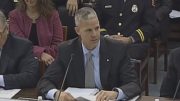By Richard Mirgon, Public Safety Consultant
This is a message for Verizon and Andres Irlando, a Verizon senior vice president and president of the carrier’s Public Sector and Verizon Connect unit. You are going down a path that is well traveled and not new. You can go back decades and see all the work done by thousands to resolve public safety interoperability and that path is lined with many failures.
Now since I am somewhat of an expert on this topic let me help you out with some observations and good history. You can look at all the standards work the Association of Public Safety Communications Officials (APCO) has done, along with the work the National Emergency Number Association (NENA) has done. There are standards that cover everything from CAD to CAD interfaces, NextGen Networks to Land Mobile Radio (LMR). The largest having been P25. They have all had varying levels of success but none of those have solved the problem.
Let’s look at P25. Even with a full set of international standards, decades of work it still couldn’t solve the problem. Why? Well, it seems that in the standards world there are always exception which are exploited by vendors who want to lock a customer into their product. Further, there are vendors who strive to keep the standard at a minimal level to allow proprietary, higher functionality to be offered to customers. Motorola has been the biggest offender and that started with them convincing public safety that the standard governing P25 encryption wasn’t good enough so it sold (and often gave away for free) its own proprietary encryption protocol for P25 networks. Now one network using the “standard” P25 encryption can’t talk to another network using Motorola’s proprietary encryption and they had a large hand in the development of the encryption standard. As you can see, they ended up creating P25 Networks that contained proprietary elements with the intent to minimize multi-vendor, standards based solutions for public safety. This type of activity goes on every day and companies convince local governments that being different is good until they need help and they can’t talk. All under the guise of purchasing a “standards based” product.
Companies are not the only one to blame. Local government creates these problems themselves. I have seen many local governments buy their own LMR systems when they could use an existing system simple because they wanted “their own”. I have also seen this happen because the person(s) writing the RFP didn’t like, and yes I am saying “like”, the other vendor. They do things like spec the size and location of the knobs on the radio (true story) to drive to a specific vendor.
Now let me help you out and tell you what you need to do to get even a chance of solving this problem. First, you have to start when there isn’t a lot of embedded technology so agencies don’t have a large investment. Then you need to get all of public safety to agree and participate in the solution. You then need to figure out a governance structure so that you have a method to review standards compliance, engage agencies and oversee the system. You need to select a standard to make the equipment cost low and competitive. You need to find vendors who will want to build to that standard without introducing proprietary and costly elements into their products. You also need to provide dedicated spectrum with a true priority and preemption system. You will then need funding in the billions of dollars. Let’s face it, this isn’t easy. And that is just a few of the key elements needed.
How do I know this? I was part of a team made up of representative of all the major public safety associations who did just that. We were called the Public Safety Alliance and the outcome is called FirstNet.
Clearly, this effort by Verizon is their next attempt to undermine FirstNet and public safety’s network that has been built for public safety. Mr. Irlando, I get that as a SVP you are concerned about the lost revenue with thousands of first responders moving to FirstNet each month. Where was that concern when you chose not to bid to build the network? Where was that concern when Verizon publicly announced 12 years ago that it would never carve out any of its network to meet public safety requirements? Where is your support for public safety when you talk about priority but its only good when a public safety agency has to ask to turn it on? Where were you when Verizon shut down 911 networks and even some rural cell sites years ago?
Let me help answer that. Your company decided that those 911 customers and rural cell sites weren’t profitable enough and that you didn’t want to be in the 911 business. Yes, you have few customers that are large customers who generate a lot of revenue but your company hasn’t gone the extra mile to build and support first responders when public safety needed it even thought it wasn’t high profit. Providing service to public safety isn’t just about those large customers, it is about all of public safety to include rural and tribal America. Public safety will not idly sit on the sidelines as your company works to undermine FirstNet. FirstNet is what we asked for and has not only met public safety expectations, it has exceeded those expectations. To see the reality of that you simply need to look at the some of the FirstNet only features. These include always on priority and preemption, the vast number of deployable assets that are FirstNet only, the large catalog of FirstNet tested apps, the ability to provide Z Axis and the availability of high power user equipment. All this and more are unmatched by any other carrier.
As I noted earlier, the path to interoperability is lined with failures that have cost public safety billions of dollars. The fact remains there is only one true success story that is fully interoperable and adheres to 3GPP standards and that is FirstNet. You are clearly trying to solve an interoperability problem that doesn’t exist.
Richard Mirgon is a Public Safety consultant focused on FirstNet. He is a Past President of APCO International and has over 35 years of public safety and first responder experience. For more information about the author please go to https://www.next-paradigm.com/about/
The views and opinions expressed in this article are solely those of the author and do not necessarily reflect the official policy or position of this company or any company with whom the author may be associated.




Be the first to comment on "Verizon Attempts Interoperability Coalition?"